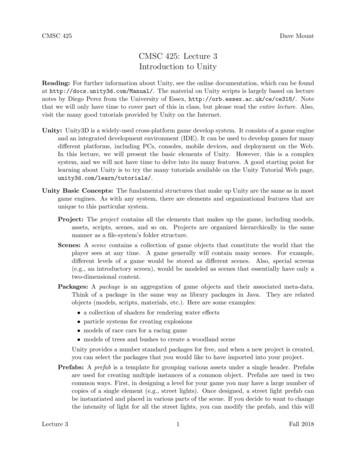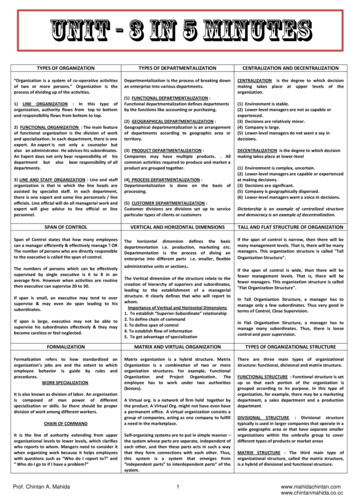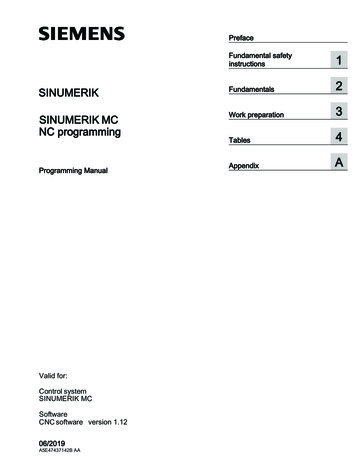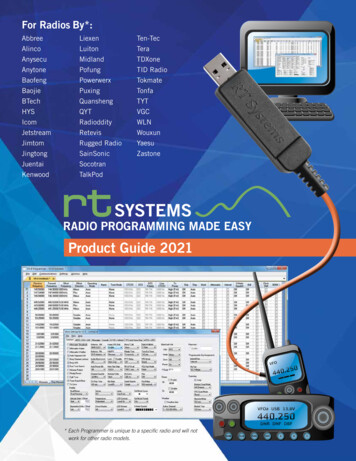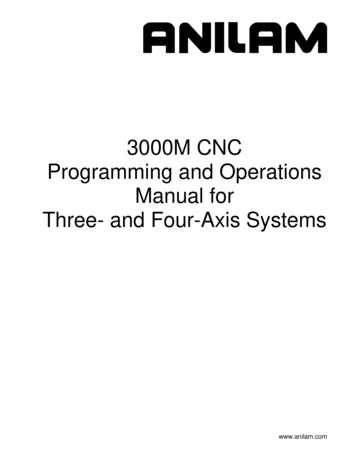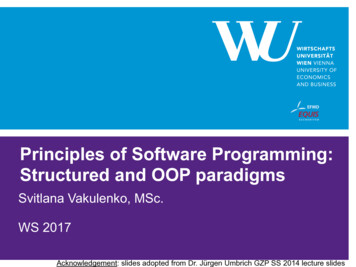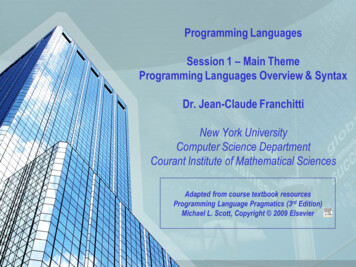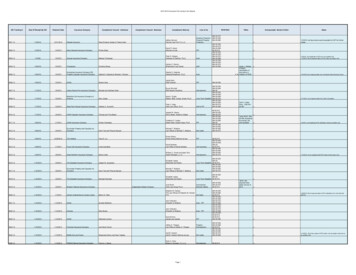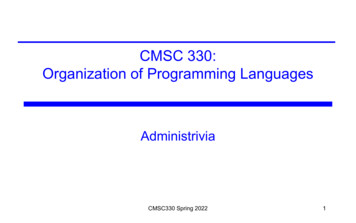
Transcription
CMSC 330:Organization of Programming LanguagesAdministriviaCMSC330 Spring 20221
Course Goals Describe and compare programming language features And understand how language designs have evolved Choose the right language for the job Write better code Code that is shorter, more efficient, with fewer bugs In short: Become a better programmer with a betterunderstanding of your tools.CMSC330 Spring 20222
Course Activities Learn different types of languages Learn different language features and tradeoffs Programming patterns repeat between languages Study how languages are specified Syntax, Semantics — mathematical formalisms Study how languages are implemented Parsing via regular expressions (automata theory) and contextfree grammars Mechanisms such as closures, tail recursion, lazy evaluation,garbage collection, Language impact on computer securityCMSC330 Spring 20223
Syllabus Dynamic/ Scripting languages (Ruby)Functional programming (OCaml)Regular expressions & finite automataContext-free grammars & parsingLambda Calculus and Operational SemanticsSafe, “zero-cost abstraction” programming (Rust)Secure programmingScoping, type systems, parameter passing, comparinglanguage styles; other topicsCMSC330 Spring 20224
Calendar / Course Overview Tests 4 quizzes, 2 midterm exams, 1 final exam ALL ONLINE Do not schedule your interviews on exam dates Lecture quizzes On ELMS, due by the end of the day of lecture Projects Project 0 - OUT NOW!Project 1 – RubyProject 2-5 – OCaml (and parsing, automata)Project 6 – SecurityP1, P2, and P4 are split in two partsCMSC330 Spring 20225
Quiz time! According to IEEE Spectrum Magazine which is the “top”programming language of 2021?A. JavaB. RC. PythonD. C CMSC330 Spring 20227
Quiz time! According to IEEE Spectrum Magazine which is the “top”programming language of 2021?A. JavaB. RC. PythonD. C CMSC330 Spring 20228
Discussion Sections Discussions will be in-person Discussion sections will deepen understanding ofconcepts introduced in lecture Oftentimes discussion section will consist of programmingexercises There will also be be quizzes, and some lecture materialin discussion sectionCMSC330 Spring 20229
Project Grading Projects will be graded using the Gradescope Software versions on these machines are canonical Develop programs on your own machine Your responsibility to ensure programs run correctly ongradescope See web page for Ruby, OCaml, etc. versions we use, ifyou want to install at homeCMSC330 Spring 202210
Rules and Reminders Use lecture notes as your text Videos of lectures will be recorded for later reference You will be responsible for everything in the notes, even if it is notdirectly covered in class! Keep ahead of your work Get help as soon as you need itOffice hours, Piazza (email as a last resort) Avoid distractions, to yourself and your classmates Keep cell phones quietCMSC330 Spring 202211
Academic Integrity All written work (including projects) done on your own Do not copy code from other students Do not copy code from the web Do not post your code on the web Cheaters are caught by auto-comparing code Work together on high-level project questions Discuss approach, pointers to resources: OK Do not look at/describe another student’s code If unsure, ask an instructor! Work together on practice exam questionsCMSC330 Spring 202212
CMSC 330:Organization of Programming LanguagesOverviewCMSC330 Spring 202213
Plethora of programming languages LISP:(defun double (x) (* x 2)) Prolog: size([],0).size([H T],N) :- size(T,N1), N is N1 1. OCaml: List.iter (fun x - print string x)[“hello, ”; s; "!\n”] Smalltalk: ( #( 1 2 3 4 5 ) select:[:i i even ] )CMSC330 Spring 202214
All Languages are (sort of) Equivalent A language is Turing complete if it can compute anyfunction computable by a Turing Machine Essentially all general-purpose programming languagesare Turing complete I.e., any program can be written in any programming language Therefore this course is useless?! Learn one programming language, always use itCMSC330 Spring 202215
Studying Programming Languages Will make you a better programmer Programming is a human activityFeatures of a language make it easier or harder to program for a specificapplication Ideas or features from one language translate to, or are laterincorporated by, anotherMany “design patterns” in Java are functional programming techniques Using the right programming language or style for a problem maymake programmingEasier, faster, less error-proneCMSC330 Spring 202216
Studying Programming Languages Become better at learning new languages A language not only allows you to express an idea, it also shapeshow you think when conceiving it You may need to learn a new (or old) languageParadigms and fads change quickly in CSAlso, may need to support or extend legacy systemsCMSC330 Spring 202217
Changing Language Goals 1950s-60s – Compile programs to execute efficiently Language features based on hardware conceptsIntegers, reals, goto statements Programmers cheap; machines expensiveComputation was the primary constrained resourcePrograms had to be efficient because machines weren’t Note: this still happens today, just not as pervasivelyCMSC330 Spring 202218
Changing Language Goals Today Language features based on design conceptsEncapsulation, records, inheritance, functionality, assertions Machines cheap; programmers expensiveScripting languages are slow(er), but run on fast machinesThey’ve become very popular because they ease the programmingprocess The constrained resource changes frequentlyCommunication, effort, power, privacy, Future systems and developers will have to be nimbleCMSC330 Spring 202219
Language Attributes to Consider Syntax What a program looks like Semantics What a program means (mathematically), i.e., what it computes Paradigm and Pragmatics How programs tend to be expressed in the language Implementation How a program executes (on a real machine)CMSC330 Spring 202220
Syntax The keywords, formatting expectations, and structure ofthe language Differences between languages usually superficialC / JavaRubyOCamlif (x 1) { } else { }if x 1 else endif (x 1) then else Differences initially jarring; overcome with experience Concepts such as regular expressions, context-freegrammars, and parsing handle language syntaxCMSC330 Spring 202221
Semantics What does a program mean? What does it compute? Same syntax may have different semantics in differentlanguages!Physical Equality Structural EqualityJavaa ba.equals(b)Ca b*a *bRubya.equal?(b)a bOCamla ba b Can specify semantics informally (in prose) or formally(in mathematics)CMSC330 Spring 202222
Why Formal Semantics? Textual language definitions are often incomplete andambiguous Leads to two different implementations running the sameprogram and getting a different result! A formal semantics is a mathematical definition of whatprograms compute Benefits: concise, unambiguous, basis for proof We will consider operational semantics Consists of rules that define program execution Basis for implementation, and proofs of program correctness E.g., used by g 202224
Paradigm There are many ways to compute something Some differences are superficialFor loop vs. while loop Some are more fundamentalRecursion vs. loopingMutation vs. functional updateManual vs. automatic memory management Language’s paradigm favors some computing methodsover others. This class:- Imperative- FunctionalCMSC330 Spring 2022- Resource-controlled (zero-cost)- Scripting/dynamic25
Imperative Languages Also called procedural or von Neumann Building blocks are procedures and statements Programs that write to memory are the normint x 0;while (x y) x x 1; FORTRAN (1954) Pascal (1970) C (1971)CMSC330 Spring 202226
Functional (Applicative) Languages Favors immutability Variables are never re-defined New variables a function of old ones (exploits recursion) Functions are higher-order Passed as arguments, returned as results LISP (1958)ML (1973)Scheme (1975)Haskell (1987)OCaml (1987)CMSC330 Spring 202227
OCaml A (mostly-)functional language Has objects, but won’t discuss (much) Developed in 1987 at INRIA in France Dialect of ML (1973) Natural support for pattern matching Generalizes switch/if-then-else – very elegant Has full featured module system Much richer than interfaces in Java or headers in C Includes type inference Ensures compile-time type safety, no annotationsCMSC330 Spring 202228
Dynamic (Scripting) Languages Rapid prototyping languages for common tasks Traditionally: text processing and system interaction “Scripting” is a broad genre of languages “Base” may be imperative, functional, OO Increasing use due to higher-layer abstractions Originally for text processing; now, much more sh (1971)perl (1987)Python (1991)Ruby (1993)CMSC330 Spring 2022#!/usr/bin/rubywhile line gets docsvs line.split /,/if(csvs[0] "330") then.30
Ruby An imperative, object-oriented scripting language Full object-orientation (even primitives are objects!)And functional-style programming paradigmsDynamic typing (types hidden, checked at run-time)Similar in flavor to other scripting languages (Python) Created in 1993 by Yukihiro Matsumoto (Matz) “Ruby is designed to make programmers happy” Core of Ruby on Rails web programming framework a key to Ruby’s popularityCMSC330 Spring 202231
Theme: Software Security Security is a big issue today Features of the language can help (or hurt) C/C lack of memory safety leaves them open for manyvulnerabilities: buffer overruns, use-after-free errors, dataraces, etc. Type safety is a big help, but so are abstraction and isolation, tohelp enforce security policies, and limit the damage of possibleattacks Secure development requires vigilance Do not trust inputs – unanticipated inputs can effect surprisingresults! Therefore: verify and sanitizeCMSC330 Spring 202233
Zero-cost Abstractions in Rust A key motivator for writing code in C and C is the low(or zero) cost of the abstractions use Data is represented minimally; no metadata required Stack-allocated memory can be freed quickly Malloc/free maximizes control – no GC or mechanisms to supportit are needed But no-cost abstractions in C/C are insecure Rust language has safe, zero-cost abstractions Type system enforces use of ownership and lifetimes Used to build real applications – web browsers, etc.CMSC330 Spring 202234
Other Language Paradigms We are not covering them all in CMSC330! Parallel/concurrent/distributed programming Cilk, Fortress, Erlang, MPI (extension), Hadoop (extension);more on these in CMSC 433 Logic programming Prolog, λ-prolog, CLP, Minikanren, Datalog Object-oriented programming Simula, Smalltalk, C , Java, Scala Many other languages over the years, adopting variousstylesCMSC330 Spring 202236
Other Languages There are lots of other languages w/ various features COBOL (1959) – Business applicationsImperative, rich file structure BASIC (1964) – MS Visual BasicOriginally designed for simplicity (as the name implies)Now it is object-oriented and event-driven, widely used for UIs Logo (1968) – Introduction to programming Forth (1969) – Mac Open FirmwareExtremely simple stack-based language for PDP-8 Ada (1979) – The DoD languageReal-time Postscript (1982) – Printers- Based on ForthCMSC330 Spring 202239
Implementation How do we implement a programming language? Put another way: How do we get program P in some language Lto run? Two broad ways CompilationInterpretationCMSC330 Spring 202240
Compilationdef greet(s)print("Hello, 23045601200312 “Hello, world!” Source program translated (“compiled”) to anotherlanguage Traditionally: directly executable machine codegcc, clang Bytecode, Portable CodeJavacCMSC330 Spring 202241
Interpretationdef greet(s)print("Hello, ”)print(s)print("!\n”)end“Hello, world!”“world” Interpreter executes each instruction in sourceprogram one step at a time No separate executableCMSC330 Spring 202242
Quiz: What do you think? Which of the following languages has implementations asa compiler and an interpreter? CPythonJavaAll of the aboveCMSC330 Spring 202243
Quiz: What do you think? Which of the following languages has implementations asa compiler and an interpreter? CPythonJavaAll of the aboveCMSC330 Spring 2022A language often has acanonical kind ofimplementation, but therecan be others44
Defining Paradigm: Elements of PLs Important features Regular expression handling Objects Declarations Explicit ImplicitInheritance Closures/code blocksImmutabilityTail recursionPattern matchingUnification Abstract types Garbage collectionCMSC330 Spring 2022 Type system Static Polymorphism Inference Dynamic Type safety45
Attributes of a Good Language Cost of use Program execution (run time), program translation, programcreation, and program maintenance Portability of programs Develop on one computer system, run on another Programming environment External support for the language Libraries, documentation, community, IDEs, CMSC330 Spring 202250
Attributes of a Good Language Clarity, simplicity, and unity Provides both a framework for thinking about algorithms and ameans of expressing those algorithms Orthogonality Every combination of features is meaningful Features work independently Naturalness for the application Program structure reflects the logical structure of algorithmCMSC330 Spring 202251
Attributes of a Good Language Support for abstraction Hide details where you don’t need them Program data reflects the problem you’re solving Security & safety Should be very difficult to write unsafe programs Ease of program verification Does a program correctly perform its required function?CMSC330 Spring 202252
Summary Programming languages vary in their SyntaxSemanticsStyle/paradigm and pragmaticsImplementation They are designed for different purposes And goals change as the computing landscape changes, e.g., asprogrammer time becomes more valuable than machine time Ideas from one language appear in othersCMSC330 Spring 202254
Learn different types of languages Learn different language features and tradeoffs Programming patterns repeat between languages Study how languages are specified Syntax, Semantics — mathematical formalisms Study how languages are implemented Parsing via regular expressions (automata theory) and context free grammars
